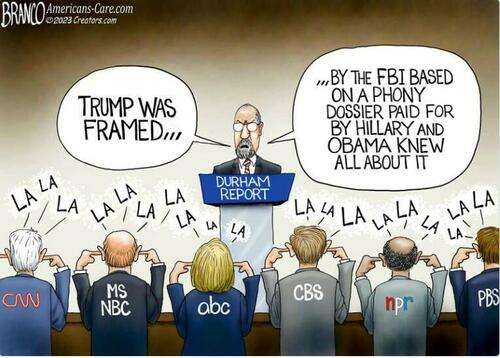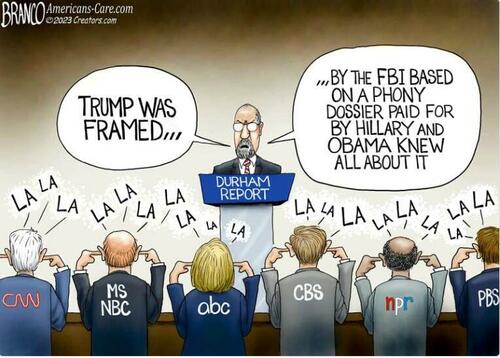“Raw, unanalyzed, and uncorroborated.”
Those words from the Durham Report summed up one of the most damning investigations in the Justice Department’s history.
In the 305-page report released May 15, special counsel John Durham concluded that the Trump-Russia investigation was launched without a required minimal level of evidence and shattered a host of departmental standards. Let that sink in: The Justice Department — as well as the media that covered it — effectively shut down a duly elected presidency, based on what turned out to be a politically engineered hoax.
That would make anyone angry. Really angry. Trump-level angry.
The fact is, in this instance, Donald Trump was correct when he said he was the target of a political hitjob funded by the Clinton campaign and maintained by virtually every media outlet. There is a word for that: disinformation.
Democrats such as former House Intelligence Committee Chairman Adam Schiff of California have pushed for censorship by claiming that disinformation is a threat to democracy.
Well, this is that threat — the real one. This actually left an administration mired in a faux scandal for years, with high-ranking officials paraded before grand juries and their guilt then proclaimed nightly on cable news shows.
Even after the Mueller investigation found insufficient evidence of collusion between the Russian government and the Trump campaign, Rep. Schiff assured the public in March 2018, that “I can certainly say with confidence that there is significant evidence of collusion between the campaign and Russia” and he repeatedly promised to reveal it in his committee.
He never did, of course. Instead, he regularly criticized Durham’s investigation and called for it to end, to prevent this report from ever being released.
Others on the intelligence committee, like Rep. Eric Swalwell (D-Calif.), also insisted there was clear evidence of collusion. No less a figure than Obama’s former national intelligence director James Clapper suggested Trump was a Russian “asset.”
For its part, most of the media portrayed the now-infamous Steele dossier — the original basis for the collusion claims — as true, and the New York Times and Washington Post received Pulitzer Prizes for a story that not only has been debunked but shown to be the product of Hillary’s Clinton’s presidential campaign.
The Durham report is everything that the FBI investigation was not. It is dispassionate, detached and detailed. It exposes the origin of the collusion effort in the Clinton campaign, which hid its funding in legal fees. (The campaign was later fined by the Federal Election Commission for that concealment.) A few reporters did ask about a possible connection to the campaign, but Clinton campaign officials lied and denied it.
There was little need for concealment, however, when there was so little interest in investigating the story, either by key FBI figures or by the media.
American intelligence discredited the Steele dossier early on as likely Russian disinformation; the credibility of specific sources for the dossier was shredded. Yet then-FBI Director James Comey opened the most extensive investigation ever into an American president based on that tawdry, tattered record.
The lack of supporting evidence did not matter.
Instead, Comey clearly relished the dossier’s more salacious details. For example, in a 2018 interview, he declared: “Honestly, I never thought these words would come out of my mouth, but I don’t know whether the current President of the United States was with prostitutes peeing on each other in Moscow in 2013.”
The “pee tape” story was repeated endlessly by the media and by Comey. Durham, however, eventually showed that the source of the story was a Clinton associate.
For Comey, though, it appeared to be one of those stories that was just too good to fully check. Nor did he appear concerned that, before the Clinton campaign pushed the dossier to the media and the FBI, then-CIA Director John Brennan had briefed President Obama and his national security team on Hillary Clinton’s alleged “plan” to tie candidate Trump to Russia as “a means of distracting the public from her use of a private email server.”
According to Durham, Comey — who later wrote and sold a book on “ethical leadership” — led the FBI to use “raw, unanalyzed, and uncorroborated intelligence” to effectively tie up a duly elected president for three years.
Durham reports that FBI personnel admitted they disregarded standards for surveillance despite “acknowledging — both then and in hindsight — that they did not genuinely believe there was probable cause to believe that the target was knowingly [working for a foreign power].”
In the end, it is not a crime to be unethical or incompetent, so no charges will be filed as a result of the report. Durham clearly hopes that the belated transparency provided by his report will produce greater future accountability. That may be the only naive aspect of his findings.
Of course, the FBI promptly issued a statement that it has — once more — reformed itself in light of its failures. But who really believes this is unlikely to occur again?
Indeed, the same pattern and figures reemerged in 2020, when another false narrative was created to dismiss the Hunter Biden laptop scandal. Some of the officials involved in the false Russia collusion conspiracy were signatories on the letter by 51 former intelligence officials claiming that the laptop story was likely “Russian disinformation.” And the media again pushed that version before the 2020 election — only to admit, two years later, that the laptop was authentic all along.
Conspicuously missing in the aftermath of Durham’s report is the one thing that would establish a clear commitment to reform: an apology. Clinton, Comey, members of Congress and others could apologize to the American people — and, yes, even to Trump.
That, of course, will never happen. Attorney General Merrick Garland, in releasing a report that concluded this investigation never should have occurred, made no statement whatsoever.
Thus, Durham was left throwing haymakers in an empty political boxing ring — and those who perpetrated this scandal on the nation are left to carry on making money on books, speeches, TV commentary and lectures about political or electoral ethics. The media, meanwhile, is offering little more than a shoulder-shrug and more spin.
So, in the relative silence of media coverage following the report’s release, Durham can contemplate an ultimate Zen-like question: If a 305-page report proves a concerted political hoax but no one is there to read it, does it make a difference?








